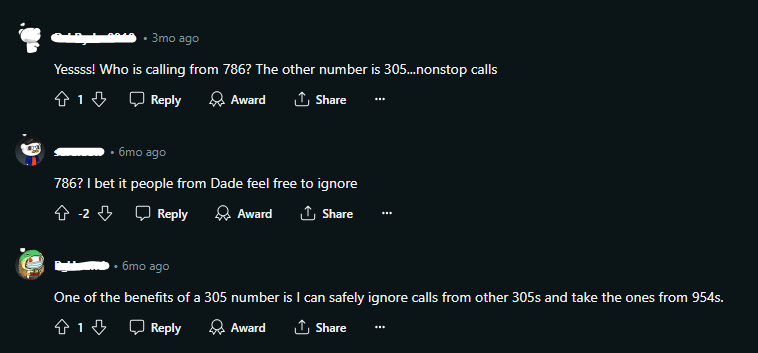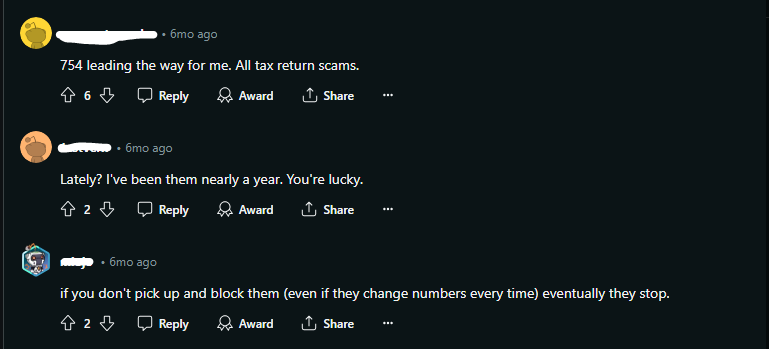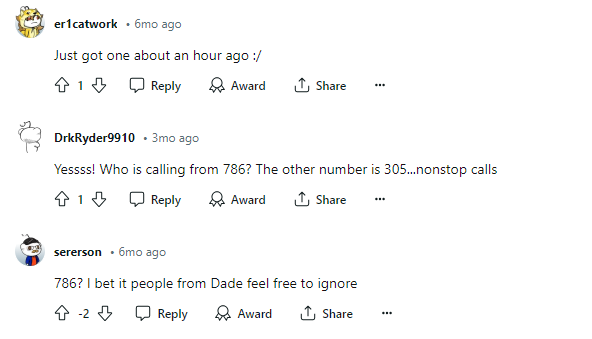Table of Content
- Where Does the 786 Area Code Come from?
- Is Area Code 786 a Spam?
- 4 Hints to Know that a Call Having Code 786 is a Scam
- Proven Tricks for Getting Rid of Scam Calls
- Getting Multiple Calls from the Same Number with the 786 Code
- What are the Most Common Numbers Used by Scammers in Miami?
- Frequently Asked Questions (FAQs)
- Fighting Back Against 786 Spam!
Have you ever felt like Miami was following you around?
If your phone continues ringing with strange 786 numbers, there's a strong chance it's not your long-lost Florida relative.
The 786 area code has become an inviting spot for spam callers, so you should be alert.
Where Does the 786 Area Code Come from?
Miami's familiar area code, 305, was not always adequate. With a growing population, the demand for more phone numbers increased.
In 1998, the 786 area code was placed on top of 305, allowing Miami residents to maintain their current address while displaying a new code. However, this convenience may have a drawback: increased spam calls.
Is Area Code 786 a Spam?
No, area code 786 is not spam. It is a real area code issued to Miami, Florida, alongside 305 and, more recently, 645.
The issue is that the 786 area code has become a hotspot for spam callers. According to studies, it is one of Florida's most common sources of scam calls. Scammers use technology to hide their location and make it look like they call from a 786 number.
BeenVerified evaluated more than 150,000 complaints over the last two years and discovered that 786 is the most common area code for scam calls in Florida.
So, while not all 786 calls are spam, be wary if you receive one from this area code, especially if you don't recognize the number or the call seems odd.

What are the Spam Calls from 786 Usually About?
Spam calls from the 786 area code come in a few common kinds:
Medical and Prescription Scams
These calls frequently offer to sell you reduced drugs, medical alerts, or other healthcare-related products. They may pressure you to give personal information or pretend your insurance supports this product.
Government Imposter Scams
These calls attempt to scare you into believing that you owe money to the IRS, are in legal jeopardy, or need to verify your Social Security number. They frequently threaten arrest or other severe penalties if you do not comply.
Debt Relief and Warranty Scams
These calls promise to help you pay off your credit card debt or provide longer warranties on your vehicle or appliances. They may try to get you to pay upfront fees or reveal personal financial details.


Home Improvement and Utility Scams
These callers may offer cheap home repairs, cleaning services, or energy plans. They may push you to sign a contract or make an advance payment.
Robert Lowry, vice president of security at BeenVerified, issues a warning. He said,
“Consumers must remain vigilant when it comes to phone calls or text messages,'
“Be skeptical about anyone demanding immediate payment or sensitive personal information. Never disclose banking details or personal data to anyone over a call or message.
If in doubt, hang up and independently find official contact details and reach out to verify.”
Discover if Your Most Critical Identifiers Have Been Exposed on the Dark Web
Receive timely alerts and actionable insights with PurePrivacy's Dark Web Monitoring.
4 Hints to Know that a Call Having Code 786 is a Scam
Various indications can help determine whether a message or a phone call from area code 786 is a scam. Here are a few tips:
- Unfamiliar Name or Contact
Check the caller's name and contact information. If the caller is unfamiliar, unknown, or spoofed (meaning they appear to be from a reputable company but are not), be cautious.
- The ‘Act Now’ Tone
Examine the content and tone of the message or call. Be careful if it is urgent, threatening, or seems too good to be true.
For example, if they claim that your account has been locked, hacked, or suspended and that you must act immediately, or if they offer you free products or prizes you did not sign up for, they are probably frauds.
- Language Error
Check the message or phone call for grammar and spelling errors. Keep an eye out for poor, inconsistent, or unprofessional behavior. For example, they are probably scams if they use all caps, misspell words, or utilize wrong punctuation.
- Asking for Your Info
Investigate the request or instruction in the message or call. Be wary if they ask you to supply personal information, financial information, verification codes, passwords, or device access over the phone or through a link. Legitimate businesses will never ask you for these things in this manner.
Proven Tricks for Getting Rid of Scam Calls
Here are some ways to reduce the number of spam calls you receive:
- Be Wary of the Tricks
Always be on the lookout for someone attempting to deceive you into clicking on links or responding to messages, whether by email, phone, messenger, or other applications. Remember that phone numbers are easily spoofable, so texts with a familiar name or number are less trustworthy.
- Enroll on the Do-Not-Call List
Add your residence and cell phone numbers to state and federal do-not-call lists to avoid telemarketers and scammers. Both lists are free but separate, so read the terms and rules for each.
- Utilize Call-Blocking Apps
You may prevent unsolicited calls on your cell phone by downloading a third-party call-blocking application. These apps detect spam calls by utilizing blacklist databases, which ban numbers that have received a large volume of consumer complaints.
Many mobile phones have built-in technologies that detect suspected spam calls and ban calls from specific numbers.
- Do Not Answer Unknown Numbers
It's compelling to pick up an unknown call, but if you don't recognize the number, let it go to voicemail. Scammers frequently rely on people's responses to validate legitimate numbers.
- Get PurePrivacy to Block Scammers
PurePrivacy protects your personal information and allows you to navigate on your terms by opting out of data-sharing practices and reducing your online record. This reduces the danger of scams and unwanted advertising.
Getting Multiple Calls from the Same Number with the 786 Code
You're receiving calls from the same number with a 786 area code, which is most likely due to a tactic known as neighbor spoofing.
This area code applies to Miami, Florida, including parts of the Florida Keys. Someone you know from the area may be calling you repeatedly.

However, it's most likely spam. Scammers use neighbor spoofing to change your caller ID. They deliberately disguise their phone number to make it appear local in hopes you will respond.
If you are from Florida, the 786 code may appear trustworthy. These calls are usually about Unwanted Offers or Scams that can trick you into calling back at a higher rate.
What are the Most Common Numbers Used by Scammers in Miami?
Specific phone numbers are frequently reported among the countless spam calls from the 786 area code. Here's a list of the most commonly reported 786 numbers in Florida:
- 7868501889
- 7862078026
- 7867469914
- 7867181315
- 7866485931
- 7863004082
- 7869290034
- 7867240506
- 7865898051
- 7865709136
Frequently Asked Questions (FAQs)
-
What other sorts of scams exist besides phone calls?

Scams can occur via email (phishing), text messaging, websites, social media, and in-person. Be aware of unwanted contact and use the same rules to avoid it: do not disclose personal information, be cautious of urgency and unrealistic promises, and report suspicious behavior.
-
What can I do to avoid investment scams?

Never make investments based on unwanted calls or pressure tactics. Before investing, conduct extensive research and only deal with certified professionals. Verify their credentials with regulatory agencies.
-
What if I believe I have been the victim of a scam?

Inform the Federal Trade Commission and any other relevant authorities about the scam. If you have provided financial information, notify your bank or financial institution immediately. There may be ways to retrieve stolen funds or avert additional damage.
-
How do I stay up to date on the latest scams?

Follow credible sites on social media, such as the FTC and the AARP Fraud Watch Network, or sign up for their email alerts for scam updates and prevention suggestions.
Fighting Back Against 786 Spam!
The 786 area code connects you to Miami and has become a breeding ground for scammers.
The increase in spam calls might be frustrating, but you can regain control of your phone with the correct tools and information.
Remember, the 786 area code is not spam; awareness is essential.
Do not hesitate to report suspicious activities to avoid falling victim to these frauds.




